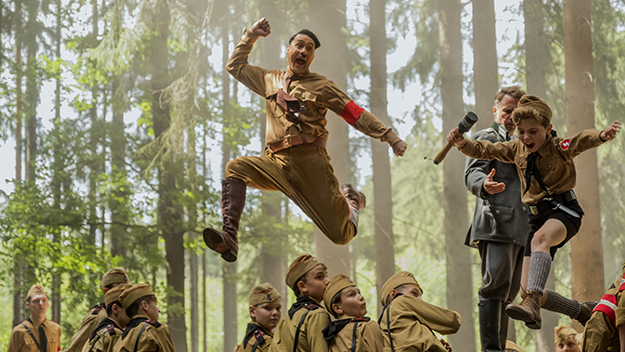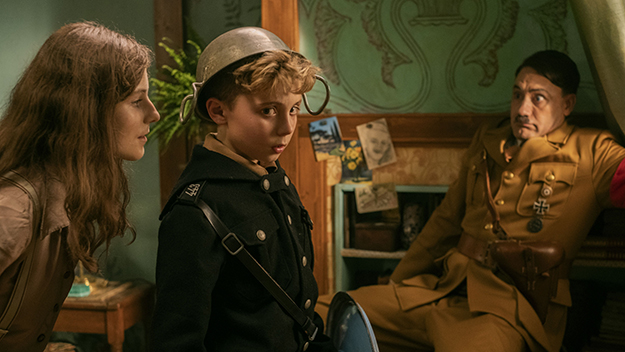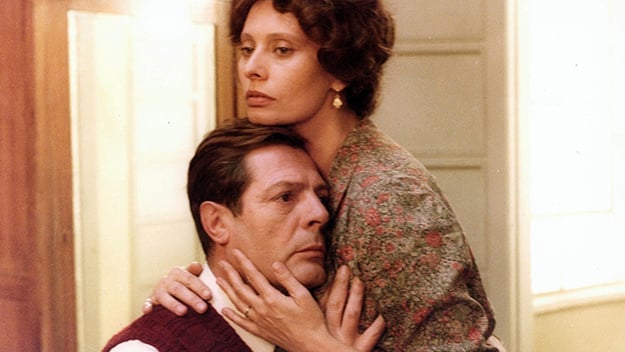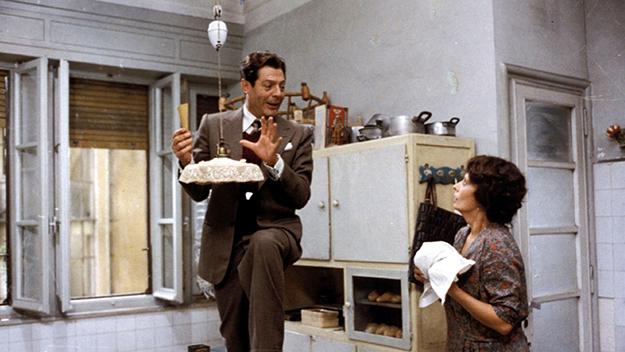Queer & Now & Then: 1977 and 2020
In this biweekly column, Michael Koresky looks back through a century of cinema for traces of queerness, whether in plain sight or under the surface. Read the introductory essay.

Jojo Rabbit (Taika Waititi, 2019)
I’ve never forgotten, and will likely never forget, when, during a lesson about the Holocaust, my 11th-grade history teacher told our class with matter-of-fact confidence that many men in the Nazi party were “homosexual fiends.” This was years before I would acknowledge my own homosexuality, but I knew well enough that this particular wording, this declaration of the “gay Nazi,” was being used to identify his aberrance more in relation to his gayness than even his fascism. The phrase came up ostensibly as a way to underline the somehow noteworthy hypocrisy of the Nazis—that, yes, they were marking homosexuals for death alongside Jews, Roma, and the disabled, but at the same time, so many of those Nazis were secretly, or as implied, not-so-secretly gay themselves. As if this created insight; as if this mattered in the context of a history lesson. Intentionally or not, the homophobia of my teacher’s phrasing—homosexual fiends—created a kind of relational sliding scale of acceptable atrocities, while also, I would come to learn years later, perpetuate a long-held stereotype.
Among the many unsuccessful elements in Jojo Rabbit, the grievous attempt at Holocaust-era satire that earned director-writer Taika Waititi an Oscar this week, is its recurring, altogether perplexing insinuations of queerness. One of its half-realized supporting Nazis, Captain Klenzendorf, played by Sam Rockwell in another of his strangely redeemable villain roles, seems to be written and performed with a hint of winking ostentation, and there are even one or two marked moments of simmering sexual chemistry between Klenzendorf and a blond SS assistant (Alfie Allen), who share some ostensibly amusing workday pregnant pauses, their faces mere inches from one another in the kind of visual gag straight people love. All at once a military captain, bureaucratic office stooge, and Boy Scout master-ish leader of a Hitler Youth brigade, Klenzendorf is seen again at the climax of the film, as the Allies are invading Berlin, triumphantly going out in a blaze of Napoleonic-camp glory alongside his second-in-command, only now they’ve bedazzled their outfits with fringed capes and epaulets, and Rockwell has a fearless, winking gleam in his now black-makeup-lined eye. And are those pink triangles they’re wearing on their modified clothes with pride?
A kind of all-purpose signifier for the closet cases and fascinating fey fascists that are hallmarks of parodic Nazi-era screen representation, Klenzendorf is just the latest incarnation of a confusing, long-running stereotype in movies that’s more based on a kind of homophobic aesthetic than any nuanced view of history. In one way, such characters—as seen in Visconti’s The Damned—exist to somewhat simplistically communicate the sexual liberation of the Weimar era, and specifically in Berlin, before freedoms were quashed in the rise of the Third Reich. But more often they only uncomfortably reaffirm gender norms: mocking limp-wristed, vaguely effeminate monsters does little more than set them in opposition to socially acceptable standards of masculinity. The historical preoccupation with, say, known homosexual Nazi Ernst Röhm, Hitler’s close ally and military officer, as evidence of a outwardly gay cabal within the party, betrays more about the ingrained homophobia with which we talk about history than it reveals any kind of meaningful irony about human nature. There is no evidence that there was any overt or down-low acceptance of gay men in the Third Reich, not that this has stopped present-day right-wing nationalists like Dinesh D’Souza from making claims—as in his rubbish propaganda Death of a Nation—that Hitler was tolerant of gays, and therefore aligning fascism with what must be for him a naggingly eternal homo decadence. Forget that, once appointed chancellor, Hitler ordered the murder of “close pal” Röhm, as part of the power-consolidating purge known as the Night of the Long Knives (memorably depicted as the massacre of a gay bacchanalia in Visconti’s film), and also, yes, that more than a hundred thousand gay men were sent to concentration camps to die after being forced to wear identifying pink triangles.

Jojo Rabbit (Taika Waititi, 2019)
To emphasize these “homosexual fiends” is to tacitly equate fascism with “deviant” sexuality, a definition persistent in any mainstream culture. But in Jojo Rabbit, Waititi is up to something stranger, stupider, and more numbingly au courant. When directly, though sympathetically, asked about the seeming presence of Rockwell’s queer Nazi character, in a video interview with the young editor of an online magazine called Pride, Waititi affirmed, in a halting, circuitous response, that this was meant to be, somehow, an image of positivity. “There were so many people from different backgrounds, different cultures, during World War II, and in every war and in every society there are people, you know, who represent two parts of… two insides of what humans are,” replies the director, who appears to be slightly blind-sided by the question. He goes on: “I like to think that Sam’s character used to frequent the Kit Kat Club or something, you know, in Berlin before the war started. I don’t know if you know what the Kit Kat Club was, but it was a very popular club back in the day.” Here, Waititi makes a conspiratorial winky face with his young interviewer, which left me confused about whether or not he knows the Kit Kat Club is a fictional invention of Cabaret—the Hal Prince, John Kander, and Fred Ebb Broadway musical that would become the Bob Fosse movie masterpiece—believed to be based on the Eldorado, the Weimar-era Berlin bar featuring drag performers and written about by Christopher Isherwood, the author of the Berlin-set stories from which Cabaret was adapted.
The conflating of the historical with the fantastical is not altogether damnable here; it’s a little odd, a little goofy, a little vague, like all of Jojo Rabbit. But then Waititi goes on: “So I like to think that was his background, you know, he was flamboyant and he was out… and then, you know, he got swept away by this war and he became a soldier and war hero, but there was still that part of him that he had to hide and he had to bottle up.” In other words, he’s taking the stereotype of the homosexual fiend and granting him agency and humanity; Klenzendorf’s gayness makes him human, a strange absolution for a murderous Nazi. It’s a choice that puts the character’s representation in a double bind that’s reflective of the whole film: in complicating the compromised humanity of the Germans, rather than focusing that much on the film’s sole Jewish character—the hidden girl played by Thomasin McKenzie, whose humanity is, I suppose, a given—the film becomes more clearly and directly, and I can only assume inadvertently, about the spiritual rehabilitation of the Germans during WWII, a project that seems, to this gay Jewish viewer, meaningless at best, offensive at worst. Pink triangles have been on occasion recouped, since the ’70s, by members of the LGBTQ community as a never-forget badge of pride, like the word queer itself, formerly a slur. The use of the imagery of pink triangles in this context, however, is ridiculous, a reminder of the genocide with which the film constantly refuses to engage and a wild oversimplification and perversion of the idea of gay pride.
Waititi has said that he sees his film as not about the past, but the present—a crucial intervention into our modern political nightmare in which white nationalism is on the rise and 20th-century history is being forgotten. I personally can’t fathom how any professional artist would believe that a light, ticklish ribbing of the people who carried out the systematic, industrialized genocide of more than six million human beings—and of Adolf Hitler himself, always an easy target for parody, portrayed here by Waititi as little Jojo’s cuddly-buffoonish imaginary friend—is somehow subversive or effective, that its faint stabs at humor would in any way help buoy the sinking ship that is our contemporary world. What does seem clear to me is that a gleefully ahistorical bit of attempted irreverence like Waititi’s film paints in such broad strokes that it risks covering over any details that might create a bigger picture.

A Special Day (Ettore Scola, 1977)
That there have likely been more on-screen representations of gay Nazis than gay victims of Nazis is one of the perplexing but transparent examples of our culture’s entrenched homophobia. I am loath to wish for—or suggest that one seek out—more cinematic dramatizations of World War II–era victimhood, but I heartily recommend Ettore Scola’s far more cinematically worthy A Special Day, a 1977 film that more seriously engages with how fascist dictatorships actually treated their homosexual subversives. Beginning with a six-minute prologue made up of archival newsreel footage, titled “The Führer’s Visit to Italy,” and accompanied by audio from a radio announcer, A Special Day triumphantly heralds Hitler’s visit to Rome on May 6, 1938, showing the crowds of Italian citizens excitedly amassing in the city streets to roll out the red carpet for the German leader, along with Joseph Goebbels and Joachim von Ribbentrop. The military pomp and wild cheers for the superstar dictator work in marked contrast to the remainder of the film, a solemn two-character drama about two people who have stayed behind in their apartments rather than visit the rally. Though he was previous to this film known mainly for comedies, Scola was a serious man, a politically engaged intellectual and a member of Italy’s Communist Party; A Special Day was the work of a comedic filmmaker who truly wanted to grapple with his country’s irreconcilable fascist past.
Shot in bleached sepia tones, Scola’s film is about the brief yet meaningful connection made between two members of society’s marginalized: worked-to-the-bone housewife and mother Antonietta (Sophia Loren), unappreciated by her six children and self-involved husband, and the bachelor across the courtyard, Gabriele (Marcello Mastroianni), whom she has never before met. The two are brought together in a meet-cute when Antonietta’s nattering, whistling pet mynah bird escapes from its cage and flies into his room. It appears to be the setup for a romance against an ominous wartime backdrop, and the casting of de-glammed Loren and Mastroianni, Italian cinema’s most romantic superstars of the period (both playing powerfully against type), would seem to indicate as much. A Special Day goes on to be something entirely different. Though Loren’s housebound loneliness is foregrounded, and it’s clear that she initially does see the handsome Gabriele as a possible partner for a forbidden affair, their bond becomes something more emotional and intellectual than sexual. A radio announcer recently fired from his job, Gabriele has been marked by government officials as a subversive. When she asks why he lost his position, he claims, vaguely, “a lack of Roman pride.” Ultimately we, and the naïve, conservative Antonietta, come to learn his excommunication was not only for his outspoken political affiliations but also, as he finally admits to her, his homosexuality. As he says, he’s “a useless naysayer with depraved tendencies.”

A Special Day (Ettore Scola, 1977)
Mastroianni’s Gabriele isn’t ashamed of himself—as a gay man, as a Communist, or as a subversive—but he must stay in hiding. He knows his time is up, and he’s just waiting for a knock on the door from the men who will come to take him away, though he remains sarcastic, pragmatic, self-deprecating. This is both repulsive and fascinating to Antonietta, who has never questioned the sociopolitical connotations of the domestic boredom she clearly feels (a great deal of the film’s first half patiently watches her as she moves around her cramped, stifling apartment alone). After she has dared to kiss him on the apartment roof while he helps her fold laundry, he first reveals his homosexuality—her response is to slap him across the face. Enraged, he chases her down the stairwell, screaming that he is a frocio (“faggot”), his words echoing throughout what we can assume is a nearly empty building, with seemingly everyone off to see Il Duce’s historic meeting. Though at first disgusted, running from him after denouncing his lack of masculinity and its connection to his political troublemaking—“People like you can’t be members of our Party, which is a party of real men”—Antonietta returns to his apartment. It’s as though on some level she realizes she has found an outcast kindred spirit. Ultimately the fascists do come to take Gabriele away, and Antonietta is left in her apartment again, like so many women in her position destined to be both a passive witness to nightmarish history as well as to her own suffocated dreams.
A Special Day is perhaps an overly polite drama, but its aching, burnished melancholy far outstrips the meek stabs at irreverence of Waititi’s comedy. As Waititi has declared about his own film, Scola intended to make A Special Day not as a safe period piece but rather as a response to contemporary political realities. In the ’70s, there had been a resurgence of nationalism in the neo-fascist Italian Social Movement party, which claimed hundreds of thousands of members by the middle of the decade, a frighteningly outspoken group in a country whose World War II crimes were by that point 30 years old and in danger of being shrugged off as a bad dream. So while Scola’s film may not offer the true subversion and the productive shock of, say, Salò, Pasolini’s throat-cutting missive about the horror of fascist ideology, made just two years earlier—and then still banned in Italy and throughout the world—A Special Day has an urgency of its own, born out of its director’s desperate need to unsentimentally reassert humanity.
“I don’t think I’m an antifascist. If anything, fascism is anti-me,” Gabriele explains to Antonietta with a sly smile. It’s a simple statement, but it gets at a rather complex truth about how certain ideologies aren’t just inhumane—they’re incompatible with individual identity. Regardless if it’s intended as broad satire, the idea that Waititi’s Captain Klenzendorf is in any way redeemed—or even relatable—by finally letting his freak flag fly implies that his identity can somehow be understood, that it can triumph over fascism. Evil ideologies swallow whole those they seduce, they don’t function alongside our better selves. There is no pride to be had.
Michael Koresky is a writer, editor, and filmmaker in Brooklyn. He is cofounder and editor of the online film magazine Reverse Shot, a publication of Museum of the Moving Image; a regular contributor to the Criterion Collection and Film Comment, where he writes the biweekly column Queer & Now & Then; and the author of Terence Davies, published by University of Illinois Press, 2014.







